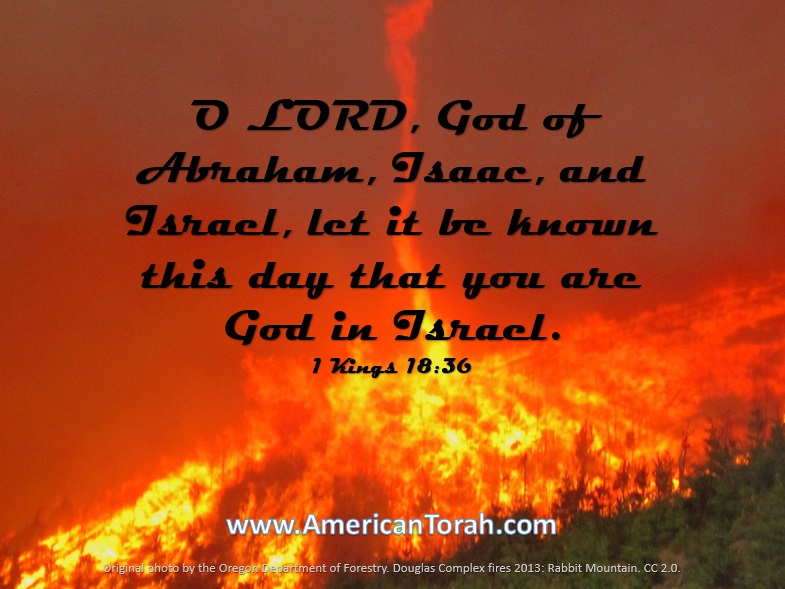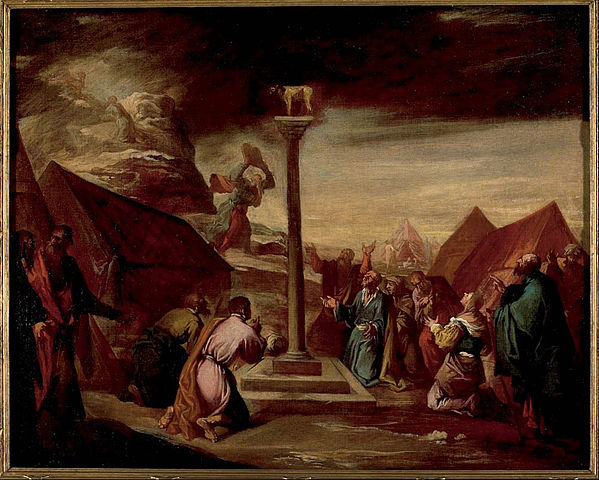My wife, Paula, is reading through Exodus, and last week she noticed several parallels between the stories of the Garden of Eden (Genesis 3) and the Golden Calf (Exodus 32). As we talked about them, those parallels deepened and it soon became apparent that both stories had Yeshua stamped all over them. I’m sure that some of those parallels will seem obvious–temptation, disobedience, passing the buck–but others are more subtle and significant.
Helping God in His Absence?
In the Garden, Eve was tempted by the serpent in the apparent absence of God and then she tempted Adam. At Sinai, the people began to doubt when it seemed like Moses wasn’t coming back. They likely felt confused and vulnerable, perhaps even abandoned. Genesis doesn’t seem to indicate the same about Eve, but her response was similar. In both cases, the people decided not to wait for God and to take matters into their own hands. They both tried to bridge a perceived gap that God had not authorized them to bridge.
In the Garden, the serpent told Eve that she could make herself like God. If mankind was created in God’s image, telling Eve that she would be like God, knowing Good from Evil, could have been intended to make her think that this is really what God wanted for them from the beginning. They could more fully accomplish their role on earth by being more like God himself.
At Sinai, he told the people that they could make themselves an inanimate mediator to represent YHWH in the camp. Since God had provided a mediator in the person of Moses and they had been unable to receive God’s Law directly from the source, they probably thought it was reasonable to make a replacement.
They weren’t trying to replace God himself; they were just trying to help him to help them.
The Surrender of Authority
People in the Bible often wore rings as symbols of authority. A ring in the ear or nose indicated submission, while a ring on the finger indicated the bearing of authority. Recall the pierced ear of the bond servant in Exodus 21:2-6 and the signet rings of Judah and Joseph in Genesis 38:18 and Genesis 41:42.
When the people demanded that Aaron make them a replacement for Moses, he told them to take the gold rings from the ears of their wives and children to make an idol, rings that symbolized their families’ submission to their authority. I believe that Aaron told them to bring these specific items and not their signets, arm bands, and other gold objects later given for the furnishings of the Tabernacle, in order to say, “You want me to disrupt your relationship with God, so I will disrupt your relationship with your families.”
Likewise, in the Garden, humanity probably would not have been expelled if Adam had not surrendered his authority over Eve to the serpent by not protecting her and instead joining her in eating of the forbidden fruit. In both stories, the people rebelled and their spiritual coverings aided and joined them.
Mankind might not have needed a savior and Israel might not have needed an earthly High Priest and priestly caste if they had not surrendered their authority to a false god.
Hiding from God
When God came to visit Adam and Eve in the Garden, they tried to hide themselves because of their shame. When he confronted them, Adam tried to blame Eve, and Eve tried to blame the serpent.
When Moses returned from Mount Sinai, the people couldn’t hide. God told him, “I have seen this people,” (Exodus 32:9) and Moses could hear the sound of their partying from all the way up the mountain. However, Aaron did try to shift the blame. First he blamed the people. “You know how these people are determined to do evil,” he told Moses in verse 22. Then he blamed the fire and gold in verse 24: “I threw it into the fire and out came this calf!”
Of course, nobody can really hide from God, and nobody can escape the consequences of their actions. It seems at first that Aaron got away without punishment for his role in the golden calf incident, but that’s not really true.
Cascading Consequences
God told Adam, “In the day that you eat of the fruit of the Tree of Knowledge of Good and Evil, you will surely die” (Genesis 2:17) and he told Moses, “Whoever has sinned against me, I will blot out of my book…In the day when I visit, I will visit their sin upon them” (Exodus 32:33-34). These statements continue to puzzle theologians today because these threats don’t appear to have been literally carried out. Adam lived more than 900 years and Aaron lived almost 40 years after their respective sins.
God did punish the people at the time of their sin. Adam and Eve were expelled from the Garden by an angel bearing a flaming sword and the Israelites at the center of the calf worship were killed by sword-bearing Levites. God condemned Adam and Eve to a life of struggle and eventual death and he sent a plague among the Israelites, but neither of these really fulfill the letter of his promise.
There are several concepts that aren’t immediately apparent in the plain text and will have to wait for another article. I’m going to focus on one of those ideas for now: A dramatic change in role is analogous to death and resurrection.
As the first man, all of humanity is blessed and cursed through Adam. He wasn’t only expelled from the garden and condemned to die himself, but every person since is also condemned to die because of what he did. On the day that Adam ate the fruit, his role in the world changed from God’s governor to a mediator of death to all humanity.
When Aaron took the authority of all the men of Israel in order to create a thing that could never act as a true mediator, he condemned himself to occupying that role. This was a mixed curse, of course. It’s a great blessing to serve God by leading his people in worship, but Aaron also died to his prior role as Moses’ prophet, giving up any chance of an ordinary life, and was metaphorically resurrected as a mediator for the whole nation.
An Insufficient Mediator
Unfortunately, neither Adam nor Aaron were capable of finally undoing the damage they had done. They had both created their roles by sinning, by becoming imperfect, and that which is imperfect can never make itself perfect again. Adam and Aaron both presided over what Paul called a “ministry of death”. They could never do anything more than guide their people until inevitable death.
Ultimate restoration required a different kind of mediator, one without sin, who had never caused the people to stumble nor participated in their rebellion. The stories of the sin in the Garden and the sin of the Golden Calf are purposely told in such a way to highlight these parallels in order to illustrate mankind’s need for a perfect mediator and redeemer in the person of Yeshua.
He filled the role of God and Moses by coming down from Heaven to observe and confront the sin of mankind.
He filled the role of Eve and the Hebrews by living as an ordinary human subject to trials, temptations, joys, and sorrows.
He filled the role of Adam and Aaron by taking authority over mankind and the responsibility of their sins onto his shoulders through the cross. Like them, he died to one life and resurrected to another, but the great and essential difference is that his death was undeserved and his resurrection complete. Adam and Aaron deserved their punishments, while Yeshua did not, and so he will remain forever a perfect High Priest and Kinsman Redeemer.





